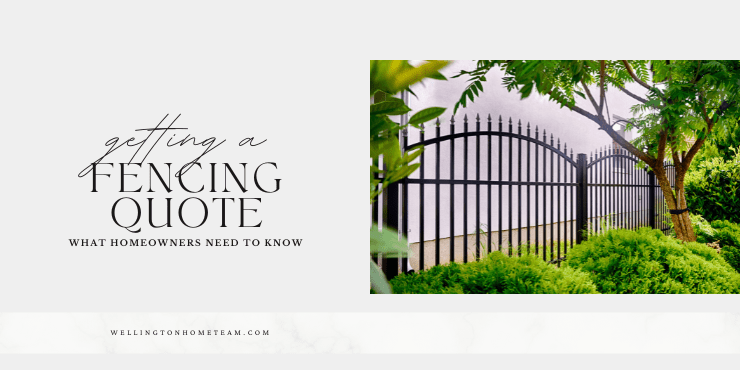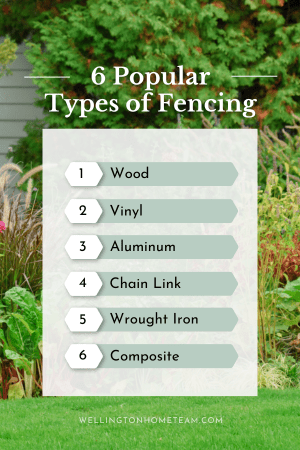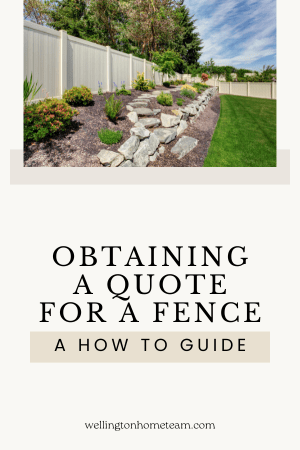Getting a Fencing Quote: What Homeowners Need to Know
When it comes to enhancing your property’s privacy, security, and curb appeal, a well-constructed fence can make all the difference. But before you start envisioning the perfect picket fence or robust privacy barrier, there’s an essential step every homeowner needs to take: getting a fencing quote.

Let’s look at what you need to know to make this process smooth and ensure you get the best value for your investment.
Why Fencing Quotes Matter
Getting a fencing quote isn’t just about finding out how much you’ll need to shell out. It’s your opportunity to:
- Understand the scope of your project
- Explore different fencing materials and styles
- Get expert insights on what might work best for your property
- Ensure you’re comparing apples to apples when looking at different contractors
- Identify potential challenges or additional costs
- Plan your budget and timeline more accurately
What to Prepare Before Requesting a Quote
Whether you’re planning to get an instant fencing quote online or planning to reach out to individual fencing service experts, you must remember to have the necessary information ready to go, This is essential in ensuring the accuracy of prices and avoiding any delays in receiving your fencing quote.
Know Your Property Boundaries
Nothing throws a spanner in the works quite like realizing your fence is encroaching on your neighbor’s land. Check your property survey or consider getting one done if you’re unsure. This step can save you from costly disputes and legal issues down the line.
Check Local Regulations
Every area has its own set of rules when it comes to fencing. In Wellington, Florida, for instance, there are specific height restrictions and setback requirements. Some neighborhoods may have additional HOA guidelines. Make sure you’re aware of these before getting too attached to any particular design. Key points to check include:
- Maximum fence height for front, side, and back yards
- Permitted materials
- Setback requirements from property lines
- Any special permissions needed for pool fencing
Have a Clear Idea of Your Needs
Are you looking for privacy, security, or just a decorative touch? Knowing this will help contractors provide more accurate quotes and suggestions. Consider factors like:
- The primary purpose of your fence
- Your aesthetic preferences
- How much maintenance you’re willing to do
- Whether you need the fence and home to be pet-proof or child-safe
- Any specific features you want (e.g., gates, lattice tops)
Consider Your Budget
Having a ballpark figure in mind can help narrow down your options and ensure you’re not wasting time on quotes for projects way out of your price range. Remember to factor in:
- Initial installation costs
- Long-term maintenance expenses
- Potential increase in property value
Measure Your Property
While professionals will take their own measurements, having a rough idea of the linear feet of fencing you need can help you get more accurate initial estimates. Walk your property line with a measuring wheel or tape measure to get an approximate figure.
Types of Fencing to Consider
Choosing the right fencing material and style for your property involves balancing aesthetics, functionality, and budget. Each option comes with its own set of advantages and drawbacks. Here’s a detailed look at some popular fencing materials:
Wood Fencing
Wood fencing offers a timeless, classic appeal that can complement a wide range of property styles. It’s often favored for its natural beauty and versatility, allowing for custom designs and finishes. However, wood fences do require regular maintenance, including staining or painting, to protect against weathering, rot, and pests. While wood is generally affordable upfront, the ongoing upkeep can add to the long-term costs.
Vinyl Fencing
Vinyl fencing is known for its low maintenance and durability. Unlike wood, it doesn’t require painting or staining, and it’s resistant to pests, rot, and weather damage. While vinyl fencing may have a higher initial cost compared to wood, its longevity, and minimal maintenance needs can make it a cost-effective choice over time. The smooth, clean look of vinyl can suit modern and traditional homes alike, but it may not have the same natural charm as wood.
 Aluminum Fencing
Aluminum Fencing
Aluminum fencing is a popular choice for pool areas and properties where low maintenance is a priority. It’s resistant to rust and corrosion, making it ideal for humid or coastal climates. Aluminum fences offer an attractive, modern look, often mimicking the appearance of wrought iron without the high cost and maintenance. However, aluminum fencing typically provides less privacy than other options, as it’s often used in open designs.
Chain Link Fencing
Chain link fencing is one of the most affordable and durable fencing options available. It’s commonly used for securing large areas, such as backyards, playgrounds, and commercial properties. While it’s highly functional, chain link fencing is often considered less attractive than other materials, and it offers minimal privacy. For those looking to enhance its appearance, options like colored coatings or adding privacy slats are available.
Wrought Iron Fencing
Wrought iron fencing is renowned for its strength, elegance, and ability to add a touch of sophistication to any property. It’s highly durable and can be customized with intricate designs, making it a favorite for upscale homes and historic properties. However, wrought iron is one of the more expensive fencing options and requires regular maintenance, including painting, to prevent rust and maintain its appearance.
Composite Fencing
Composite fencing is an eco-friendly option made from a blend of wood fibers and recycled plastics. It offers the look of wood without the extensive maintenance, as it’s resistant to rot, pests, and weather damage. Composite fences are also durable and long-lasting, making them a good investment. However, they can be more expensive upfront compared to traditional wood or vinyl, though the reduced maintenance costs may offset the initial investment over time.
Each fencing material brings its own unique set of benefits and challenges. Consider your specific needs, budget, and aesthetic preferences to find the best option for your property.
Getting a Fencing Quote: What Homeowners Need to Know | Get the information you need to obtain accurate fencing quotes, select the best contractor, and plan your project with this helpful guide. #fencing #fencequote
What a Good Fencing Quote Should Include
A comprehensive fencing quote should cover:
- Materials and their quality
- Labor costs
- Any necessary permits and their fees
- Site preparation (if needed)
- Removal of old fencing (if applicable)
- A timeline for the project
- Warranty information
- Payment terms and schedule
- Details on post-installation cleanup
- Any potential additional costs (e.g., for difficult terrain)
Questions to Ask When Getting a Quote
To ensure you’re getting all the information you need, consider asking:
- How long has the company been in business?
- Are they licensed and insured?
- Do they offer a warranty on both materials and labor?
- Will they handle permit applications?
- What’s their policy on unexpected issues or additional costs?
- Can they provide references from recent clients?
- What’s their estimated timeline for the project?
- Do they subcontract any part of the work?
Red Flags to Watch Out For
Be wary of quotes that:
- Seem too good to be true (they probably are)
- Don’t include a breakdown of costs
- Require large upfront payments
- Come from contractors who aren’t licensed or insured
- Are provided without a proper site visit or measurements
- Don’t include a written contract
- Pressure you to make an immediate decision
The Digital Revolution in Fencing Quotes
Gone are the days when getting a fencing quote meant waiting for multiple contractors to come to your property, take measurements, and get back to you days (or weeks) later. The digital age has revolutionized this process, making it faster and more convenient for homeowners.
Many fencing companies now offer online quoting tools where you can input your project details and receive quick, tailored quotes. This approach not only speeds up the process but also allows you to compare options more easily. However, remember that while these tools are convenient, they should be followed up with an in-person assessment for the most accurate quote.
Understanding the Quoting Process
A typical fencing quote process usually involves:
- Initial contact or online inquiry
- A site visit by the contractor
- Discussion of your needs and preferences
- Measurements and assessment of the property
- Review of material options
- Calculation of costs
- Preparation and presentation of the quote
- Follow-up questions and clarifications
- Potential negotiation
- Acceptance of the quote and signing of a contract
Getting a Fencing Quote: What Homeowners Need to Know | Get the information you need to obtain accurate fencing quotes, select the best contractor, and plan your project with this helpful guide. #fencing #fencequote
Factors That Can Affect Your Quote
When planning a fencing project, it’s essential to understand the various factors that can influence the final cost. Here’s a closer look at what can affect your quote:
Length and Height of the Fence
The size of your fencing project is one of the most significant cost drivers. A longer fence will naturally require more materials and labor, while the height will determine the type and amount of materials needed. Taller fences often require more robust support and additional features, which can increase the overall cost.
Chosen Materials
The material you select for your fence is crucial to the final price. Options like wood, vinyl, metal, and composite all come with different price tags and maintenance requirements. For example, while wood may offer a classic look at a lower upfront cost, it may require more maintenance over time than vinyl or metal.
Terrain of Your Property
The landscape of your property can impact the complexity of the installation. Uneven ground, slopes, or rocky soil can make the installation more challenging and time-consuming, leading to higher labor costs. These conditions may also require specialized tools or techniques, adding to the expense.
 Accessibility of the Installation Site
Accessibility of the Installation Site
How easy it is for workers to access the site where the fence will be installed can also affect the cost. If the area is difficult to reach or requires special equipment to transport materials, the installation process may take longer and require more resources, increasing the overall price.
Removal of Old Fencing
If there is an existing fence that needs to be removed before the new one can be installed, this will add to your total costs. The removal process can be labor-intensive, especially if the old fence is in poor condition or deeply embedded in the ground.
Custom Features or Designs
Adding custom elements such as decorative gates, intricate designs, or unique materials can significantly increase your costs. Custom features often require more detailed craftsmanship and specialized materials, which can lead to a higher quote.
Local Labour and Material Costs
Prices for labor and materials can vary depending on your location. In some areas, labor costs may be higher due to the cost of living, while material costs can fluctuate based on local availability and demand.
Time of Year
The timing of your project can also impact the cost. Fencing companies may charge more during peak seasons when demand for their services is higher. Scheduling your project during the off-season could potentially save you money.
By considering these factors, you can better anticipate the costs associated with your fencing project and plan your budget accordingly.
Making Your Decision
Once you’ve gathered your quotes, it’s decision time. Here’s what to consider:
- Compare apples to apples: Ensure you’re looking at quotes for the same materials, quality, and scope of work.
- Look beyond the price: The cheapest option isn’t always the best. Consider the contractor’s reputation, the quality of materials, and the warranty offered.
- Ask questions: Don’t hesitate to reach out for clarification on any aspect of the quote.
- Check references: Contact past clients to gauge their satisfaction with the contractor’s work.
- Review the contract carefully: Ensure all details discussed are included in writing.
- Consider long-term costs: Factor in maintenance and potential repair costs over the life of the fence.
- Trust your gut: If a contractor makes you feel uneasy, it might be best to look elsewhere, even if their quote is attractive.
The Importance of Proper Installation
Remember, even the highest quality fencing materials can fail if not installed correctly. Proper installation ensures:
- The longevity of your fence
- Compliance with local codes and regulations
- Avoidance of future issues with neighbours or local authorities
- Optimal performance in terms of security and privacy
This is why it’s crucial to choose a reputable, experienced contractor, even if their quote isn’t the lowest.
Maintaining Your New Fence
Once your fence is installed, proper maintenance will ensure it lasts for years to come. Different materials require different care, but general maintenance tips include:
- Regular cleaning
- Prompt repair of any damage
- Repainting or restaining wood fences every few years
- Checking and tightening hardware annually
- Trimming vegetation away from the fence
Be sure to ask your chosen contractor for specific maintenance advice for your chosen fencing material.
Final Thoughts
Getting a fencing quote is more than just a step towards beautifying your property—it’s an important part of ensuring your investment is sound and your project runs smoothly. By knowing what to expect and what to look for, you’re setting yourself up for success.
Remember, a good fence is an investment in your property. It enhances your home’s value, provides security, and can significantly boost your curb appeal. Taking the time to get comprehensive, clear quotes from reputable contractors is the first step towards enjoying all these benefits.
Whether you’re in Wellington, Florida, or anywhere else, the principles remain the same: do your homework, know what you want, and don’t be afraid to ask questions. Your perfect fence—and peace of mind—awaits!
Please consider spreading the word and sharing; Getting a Fencing Quote: What Homeowners Need to Know
Getting a Fencing Quote: What Homeowners Need to Know | Get the information you need to obtain accurate fencing quotes, select the best contractor, and plan your project with this helpful guide. #fencing #fencequote
About the Author
Top Wellington Realtor, Michelle Gibson, wrote: “Getting a Fencing Quote: What Homeowners Need to Know”
Michelle has been specializing in residential real estate since 2001 throughout Wellington Florida and the surrounding area. Whether you’re looking to buy, sell or rent she will guide you through the entire real estate transaction. If you’re ready to put Michelle’s knowledge and expertise to work for you call or e-mail her today.
Areas of service include Wellington, Lake Worth, Royal Palm Beach, Boynton Beach, West Palm Beach, Loxahatchee, Greenacres, and more.
